The government of President Javier Milei got reason to hope that its recent political and economic victories would continue in the legal arena when US appeals judges signalled openness to overturning a US$16-billion court judgment against the South American nation.
During oral arguments on Argentina’s appeal, two of the three judges asked sceptical questions about whether the US District Court case that resulted in the massive award, which interest has now swelled to US$18 billion, should have proceeded there. The suit was filed by former shareholders affected by the nationalisation of Argentine oil company YPF SA in 2012.
“It does have a feel like it should have been litigated in Argentina,” US Circuit Judge Denny Chin said during the hearing. “How would we be feeling about letting Argentina decide on issues against the US?”
Shares in litigation funder Burford Capital Ltd, which acquired the ex-shareholders’ interest in the case, fell as much as 15 percent in New York trading during the hearing. The firm’s US shares ended the day down more than nine percent.
The decision by the US Second Circuit Court of Appeals isn’t expected for several months at least, and the losing party would likely then appeal to the US Supreme Court.
But the tenor of Wednesday’s hearing was positive for Argentina. It comes as US President Donald Trump’s affinity for Milei – and a resulting US$20-billion lifeline from the US Treasury – has boosted the country’s image with investors. That backstop and US intervention in the local currency market may have contributed to the runaway victory for Milei’s party in Argentina’s midterm elections on Sunday.
Those developments didn’t come up in Wednesday’s arguments before the Second Circuit. Similar to Chin, US Circuit Judge Beth Robinson asked difficult questions about a US court hearing the ex-YPF shareholders’ case. The third member of the panel, US Circuit Judge Jose Cabranes, seemed less sympathetic to Argentina’s argument.
In a statement, the Argentine government said it “is optimistic that the United States Court of Appeals for the Second Circuit will overturn the District Court’s flawed decision, recognising that US courts should not reach out to decide cases that belong in other countries.”
Burford referred a request for comment on the hearing to Mike Fragoso, a lawyer for the ex-shareholders. Fragoso said the plaintiffs’ lawyers “remain confident that the facts are on their side and that justice will prevail as it already did in the District Court.”
‘Riding high’
Even before Wednesday’s hearing, Milei’s winning streak had already strengthened Argentina’s hand vis-à-vis the former shareholders. Even if the appeals court upholds the judgment, the plaintiffs will struggle to collect. They had been counting on complicating Argentina’s return to international markets to force the country into settlement talks, which it has so far resisted.
Speaking before the hearing, Mark Weidemaier, a law professor at the University of North Carolina, Chapel Hill, specialising in sovereign debt disputes, said the recent United States and Wall Street embrace of Argentina isn’t good news for Burford. He pointed out that paying a foreign creditor would be politically unpopular in Argentina.
“If a government is riding high, it won’t have much reason to settle unless the creditor can find a way to disrupt market access,” Weidemaier said.
Prior to the hearing, Fragoso said investors were watching Argentina’s behaviour closely and would be likely to react negatively if the country avoided its obligations.
“The smart decision for the Milei government is to put this matter behind them and move forward in the global economy without the baggage this case has and will continue to create for them,” Fragoso said.
To be sure, the legal fight is expected to drag on for months, even years, and the situation could change. A victory for the plaintiffs at the Second Circuit could boost Burford’s position by reminding foreign investors of their trepidations about Argentina. But Jared Lou, a portfolio manager on the emerging-markets debt team at William Blair & Co, thinks it will take a lot to bring Argentina to the table.
“Milei will only do it when he absolutely has to, when it’s at a stalemate,” said Lou.
US District Judge Loretta Preska in New York issued the massive award two years ago, after finding that Argentina’s 2012 nationalisation of YPF violated the company’s by-laws requiring a tender offer. Preska has already authorised the plaintiffs to try to collect on the judgment, which has spawned a separate monumental legal battle.
Weidemaier said Burford’s position is weaker than that of Elliott Management’s Paul Singer, who fought a bruising 15-year legal battle with Argentina over its 2001 sovereign debt default. Argentina finally settled that case for US$4.7 billion. Because Singer held Argentine debt, his claims directly clouded the country’s ability to raise new capital while his case was outstanding.
Since the YPF case isn’t tied to sovereign debt, that could make it harder for the ex-shareholders to go after Argentine bond issues, Weidemaier said. But they have gone after the Argentine government’s 51 percent stake in YPF, and Preska ruled in June that the Burford-backed plaintiffs were entitled to the shares. The Second Circuit put a hold on her order that Argentina hand over the shares, which is subject to a separate appeal.
Julian Ku, an international law professor at Hofstra University, said before Wednesday’s hearing that Preska’s ruling on the YPF stake shows that the plaintiffs have cards to play.
“Burford can make life miserable for Argentina, and they have a judge who is motivated to execute the order,” said Ku. “I wouldn’t want to mess with that.”
‘Big hammer’
Weidemaier said Preska’s handover order was the plaintiffs’ “big hammer” at this point.
But the US government, under both the Trump and Biden administrations, has supported Argentina’s position on the shares handover issue. In November 2024, the Justice Department said in a court filing that it wanted “to reiterate its long-standing position that foreign sovereign property located abroad is not subject to execution in US courts.”
The Biden administration expressed concern that letting the plaintiffs seize Argentina’s shares could invite foreign courts to similarly target US assets.
Apart from those shares, Weidemaier said the plaintiffs only had “a small subset of assets to try to collect with.” It’s a situation Singer similarly faced in trying to collect on his US court judgments.
Ku said there was a possibility that Trump’s friendship with Milei could benefit the plaintiffs as well.
“It could be a Trump-style deal where Argentina gets this case settled, and the US protects American investors,” Ku said. “It could have a happy ending.”
related news
by Jonathan Gilbert & Bob Van Voris, Bloomberg


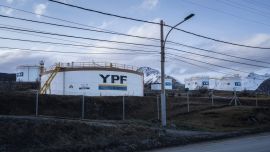




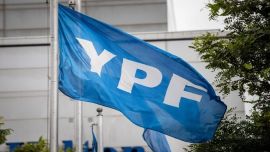






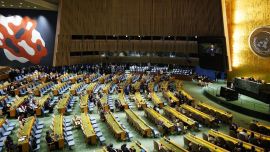
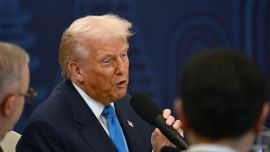
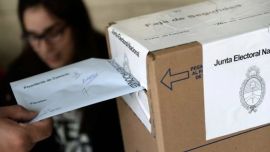
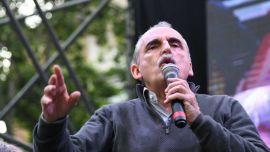


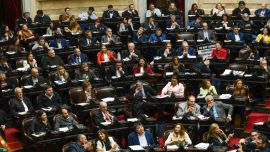
Comments